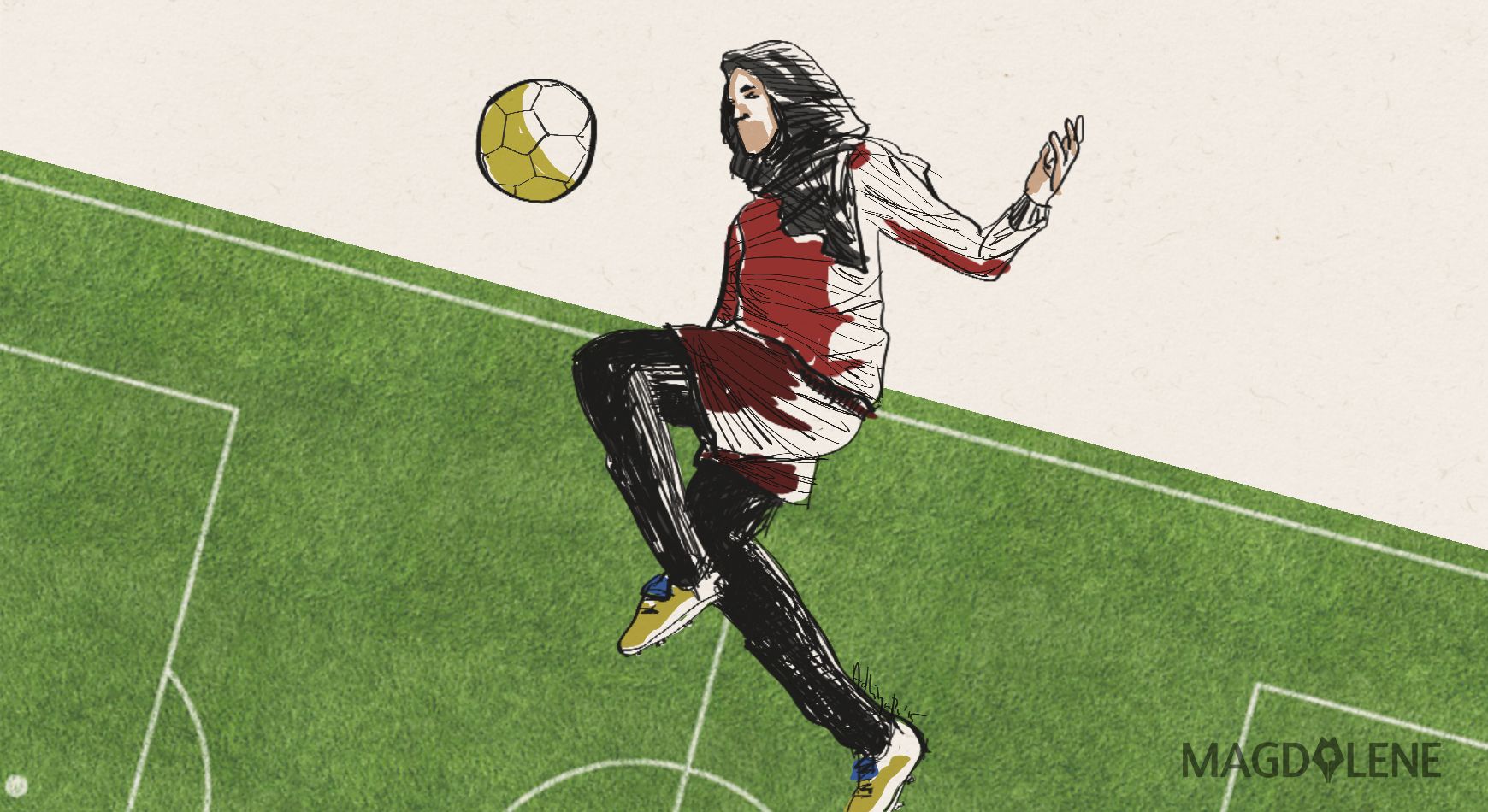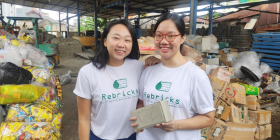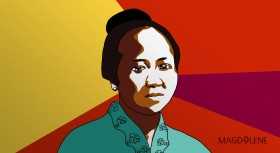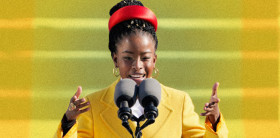Back in the 1980s, Indonesia had a national women’s football league, Galanita. It was popular and the players were treated like celebrities. But for some reasons the league has since gone downhill and remained in a stagnant mode.
This situation is not unique to Indonesia, which still has under-20 women’s team competing in regional competitions. Even in soccer giant Spain, home to some of the highest-paid footballers, women footballers are paid next to nothing and face discriminative treatment.
There are many factors at play that makes football not a very popular sport among women, among them is the public perception, especially among parents, that football is a rough sport for girls and women.
In a bid to shed this misperception, Jakarta-based International Center for Islam and Pluralism (ICIP) and the Australian Embassy held “Soccer Clinic: Social and Community Engagement” on May 18-28, 2015, to campaign for football for young women in in a number of pesantren or Islamic boarding schools and public schools in the country. The campaign is elaborated into the program “Female, Football and Fun: Playing Football while Learning English”.
At the center of these events is Australian woman footballer Assmaah Helal who is also a hijab-wearing Muslim. The 28 year-old Egyptian-Australian has been playing with the University of South Wales team and was named “Muslim Sportsperson of the Year” in Australia in 2012.
She has successfully advocated for the hijab to be part of uniform, under FIFA laws, allowing Muslim women to compete at the international level. Graduated from the University of Western Science with a major in sports and exercise, Helal works for Football United, an organization that uses football to promote social harmony and youth leadership and life skills. She also works with an initiative called Go Active, which is promoting any sport for Muslim women.
Magdalene recently talked to her and below are excerpts from the interview.
Magdalene: How did you first get interested in playing football?
Assmaah Helal: I started when I was about 5 years old. My dad migrated from Egypt and he was a huge football fan. He used to play football in Egypt as well. And he registered all of my brothers in a football team. I used to go and watch them play all the time and so on. I’m the only girl (in the family). I wanted to play as well. So, my dad said, yeah. He supported my decision to play and encouraged me, watched me play in every game.
I was playing with boys’ team because there wasn’t any girls’ team in that age. And I felt kind of left out because the boys only passed the ball to each other. So I left for a while, played different sports like tennis and athletics. But I realized that those sports didn’t give me much joy, so I went back to playing football when I was 12, when I started wearing the hijab.
When did you start playing professionally?
I don’t classify myself as a professional athlete because I’m not paid as professional athlete. I’m more of an amateur athlete. I play for the women’s premier league team called the University of South Wales. I started playing for them five years ago. But before that, I was playing just in a local club and I had injured myself in 2009. I tore my knee ligament and I’ve had surgery, gone into rehabilitation… very challenging.
Usually people think that after an injury you’re not going to play again but I decided to keep going and go through my rehab. And with the support of my teammates and the coach, I came back for one season with the local club, got my fitness and skills back and tried out for the premier league team. I became the captain and two years later we won the league.
I think if more Muslim women want to do something, then associations will adapt to our convenience.
We have an article about women footballers in soccer-crazy Spain, how they are paid next to nothing and have to keep their day jobs. How is the situation in Australia?
Even in Australia it is the same. There is only a limited number of professional women footballers that are on full time salary. The rest has to keep up a day job. There are still a lot of works that need to be done in terms of supporting professional female athletes.
It’s different in the US; they’re amazing. (Women footballers) are like celebrities. They’ve got excellent program and have college football, grassroots football…a lot of investments go into it. But in Australia I think a lot of work need to be done in terms of media and funding…but it’s getting there, it’s on the rise. But men’s football is what sells unfortunately.
We used to have the women’s national league played on the ABC but that funding got cut. The timing of the games, maybe, on the day, with different audience. The women’s national league still exists. I think they’re actually adding extra teams into the league now, which is good.
What is it about football that makes you enjoy playing it?
Football for me, and for everybody, is a sport that is universal. It’s played by everybody regardless of your background, regardless of the skin color, the language you speak. If you’re a boy or a girl, everyone knows football.
Football United is working with young refugees and new migrants and (football) as a way for them to feel like they belong in the community. Because they don’t speak English yet and feel isolated. But when we play football together with other local youth, they feel like they’ve made new friends and helped them learn English.
It’s a powerful tool to bring and promote social harmony and it’s given me some great skills. It’s built my confidence, it’s taught me leadership skills, communication, teamwork, the ability to have discipline.
Were many people surprised to see a woman footballer wearing hijab?
So when I came back to playing at 12 years old, I was going through a lot of self-esteem, body image issues. You know, you’re going through puberty, you just started putting on hijab, you still figured out your own identity. So, for me it was more about self-conscious problem, and I was maybe paranoid of what other people would think. But really, to be honest, I was received very well. I don’t remember having any issue. If anything, people were very supportive and welcoming. No challenges. Assmaah Helal and Indonesian students. (Photo: Courtesy of ICIP)
Assmaah Helal and Indonesian students. (Photo: Courtesy of ICIP)
FIFA only lifted the ban on hijab in 2012, right?
Yes, but I think officially, it was last year that they put out the actual uniform. But previously they had trials to see if hijab would cause injury. So, after a lot of petitions and education and testing, they decided that it was safe and it can be part of the uniform.
But that to be honest was for international level. If it’s for national, local levels, they’re not that strict, and it really depends on the referees.
So what’s the uniform like? What do you usually wear?
I wear skins or tights, and I have socks, shorts, and I have the jersey, underneath I wear long sleeve, and then I wear my hijab. In the rulings, they say the scarf has to be the same color as the jersey. It’ll be annoying if your shirt is bright green (laughs).
You said people were welcoming seeing a hijab-wearing footballer. What about the society in general? Do you face any kind of discrimination as Muslim?
I speak for myself, and I say I don’t. If anything, hamdallah (Praise to God), I found it opened doors for me. I’ve gotten jobs because of it, because they were looking for women that have experience working with people from multicultural background. So they’re looking to employ someone with diverse background, who has the skill to work with the community.
But some of my friends have experienced discrimination, yes. So, I won’t say that discrimination is non-existence, but it’s in minority. It’s very small cases. And I think it’s really up to us, as Muslim and as women, to really strive for excellence and be good role models and really achieve our goals. We set goals to make us happy, not what people expect of us, and to challenge the stereotype.
You said that women footballers have to keep their day job. What about you?
Yeah, I don’t get paid from my football (laughs) so I have to survive. If anything I have to pay fees to play. I work full time for Football United, an organization that uses football to promote social harmony and youth leadership and life skills. But I also do community work on the side with an initiative called Go Active, which is promoting any sport for Muslim women.
Do Muslim women still have barriers to go into sports? I mean, from the family.
Yes, very much so. There are a few different barriers. There’s the resource barrier, which is affording to pay for the fees. And then there’s the cultural barrier, similar to here, not understanding or not having the awareness that sport is good for girls as much as it is for boys and that their role isn’t just working in the house and go to school. Like they can have a hobby that helps empower them. And then there’s also the mindset around dress code, not understanding or not comfortable with wearing certain type of clothing. Or even the sport they choose might not accept the hijab. Like netball used to not accepting hijab and enforced girls of wearing skirts and they couldn’t wear leggings. No Muslim women could play netball at that point. But that has changed now and they are a bit more flexible.
I think if more Muslim women want to do something, then associations will adapt to our convenience. But if the associations don’t even know Muslim women want to play or care about playing, there’s no need for them to change, you know what I mean? So, gradually over time, numbers are rising, like football for Muslim women is slightly on the rise. But other sports as well.
My dream is to encourage other girls to set goal for themselves and really work hard to achieve in anything they want, from football to medicine.
So, how did you get involved with the program here?
In 2012 I came here as Muslim exchange program participant through the Australian Embassy. I met people from ICIP Global and then I came back in 2013 for another program with Rumah Cemara, women’s leadership and courage education program.
This year, ICIP contacted me to promote women’s football with the support of the Australian Embassy. It’s a two-week pilot program to create awareness to really educate the public to show that women can play football. Really, I think more needs to be done in terms of creating opportunities for girls to play football.
It’s not just a Muslim problem; it’s a global problem that still considers football as a rough sport for women. Even in Australia, European girls that I know, their parents don’t want them to play football. I don’t know why – it’s not a dangerous sport. Any sport can be dangerous. Walking across the street can be dangerous.
How has the respond so far from the students here?
Oh, so good. I’ve been so overwhelmed. I think they appreciate a foreigner comes visit them, number one. Number two, some have never touched the football in their lives before, but they really enjoyed it. After we finished, they said, oh we want to play more, come back. There are girls who have practiced before, maybe with their brothers, and they have really good skills. They are just crying out for opportunities like that. If it’s not a career, they don’t have to play professionally, it’s just an outlet for them to play together, have a sense of community. Imagine all the girls in the pesantrens play in the tournament, they’d play regionally, and then nationally…that would be amazing! It will promote harmony and fair play and empowerment.
What is your plan, do you still want to play football?
I think I’m too old now to dream to play for Australia. My dream is to encourage other girls to set goal for themselves and really work hard to achieve in anything they want, from football to medicine. Really just creating opportunities to take part in sports, to feel empowered, to feel confident about themselves. So, yeah, to continue working with Football United is where I see myself in a long term.








Comments